- Available Now
- New eBook Additions
- New Kids Additions
- New Teen Additions
- Magical Realism
- Best Books of 2024
- National Library Lovers' Month!
- See all ebooks collections
- Available Now
- New Audiobook Additions
- New Kids Additions
- New Teen Additions
- Magical Realism
- Best Books of 2024
- See all audiobooks collections
- Cooking & Food
- Home & Garden
- Health & Fitness
- Fashion
- News & Politics
- Crafts & Hobbies
- Celebrity
- Tech & Gaming
- Cars & Motorcycles
- Family & Parenting
- Sports
- Travel & Outdoor
- Photography
- See all magazines collections



